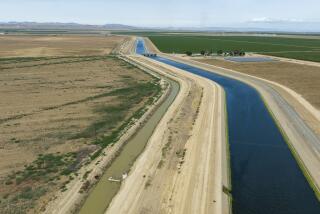El Paso Corp. Executive Tells Regulators of Collusion on Natural Gas Deal
- Share via
WASHINGTON — The head of a Texas energy conglomerate personally endorsed a deal between two subsidiaries accused of manipulating the natural gas market in Southern California to drive up prices, a senior official of the firm testified Thursday.
The testimony in a trial-like hearing before the Federal Energy Regulatory Commission raised questions about whether top officials of Houston-based El Paso Corp. violated FERC rules requiring arm’s-length dealings within a corporate family.
For the record:
12:00 a.m. May 26, 2001 FOR THE RECORD
Los Angeles Times Saturday May 26, 2001 Home Edition Part A Part A Page 2 Zones Desk 2 inches; 49 words Type of Material: Correction
Energy hearing--A headline Friday incorrectly described testimony by El Paso Merchant Energy Group President Ralph Eads before the Federal Energy Regulatory Commission. Eads testified that his superior approved a contract between two El Paso subsidiaries, but did not suggest that the approval represented collusion, as stated in the headline.
The admission by El Paso executive Ralph Eads marked a shift from his previous testimony and was elicited through sharp questioning by an angry judge who threatened to subpoena Eads’ boss.
At issue is a February 2000 contract between El Paso Merchant Energy Group, a subsidiary that sells natural gas, and El Paso Natural Gas Co., another subsidiary that owns and operates pipelines. El Paso Merchant paid $38.5 million last year for the right to ship as much as 1.2 billion cubic feet of natural gas per day to California.
The California Public Utilities Commission alleges that El Paso Merchant took advantage of the deal to withhold shipping capacity on the pipeline, creating an artificial shortage that sent Southern California prices soaring.
Southern California Edison estimates that El Paso Merchant’s actions added $3.7 billion to the state’s total energy bill, since most power generators rely on natural gas.
The El Paso companies deny any impropriety and blame increased demand, low storage capacity and other independent factors for a fivefold increase in California natural gas prices since early last year. El Paso’s lawyers have called the $3.7-billion estimate “absurd.”
Eads, president of El Paso Merchant, testified Thursday that he obtained the tacit approval of William A. Wise, head of corporate parent El Paso Corp., for the contract with El Paso Natural Gas Co.
Only 24 hours earlier in the same courtroom, Eads had portrayed Wise’s role in the pipeline deal as marginal. Eads had suggested that he merely briefed Wise on a deal that Eads was in charge of.
But on Thursday, Judge Curtis L. Wagner Jr., apparently relying on company documents that remain under court seal, said Eads’ explanation was not believable.
“I think I’m being given the run-around on this,” Wagner told Eads in open court, startling lawyers for both sides into a dead silence. “I am just appalled that you are trying to pull something over my eyes.”
Wagner then threatened to subpoena Wise. Eads quickly said he had essentially obtained Wise’s approval to enter into the contract at a Feb. 14, 2000, meeting.
“I saw from his [Wise’s] body language . . . everything [was] fine,” Eads said.
William Scherman, lead lawyer for El Paso Merchant, said there was no attempt to deceive the judge.
Although FERC’s governing board ruled that the contract between El Paso Merchant and El Paso Natural Gas was arms-length, Wagner said early in the case that he would reexamine the issue.
Wagner, FERC’s chief judge, will render an initial decision to the governing board on whether the El Paso companies acquired monopolistic power and used it to harm California consumers.
Regina Speed-Bost, a lawyer observing the case for the city of Los Angeles said it was clear El Paso Merchant sought and received the authority of its corporate parent.
More to Read
Inside the business of entertainment
The Wide Shot brings you news, analysis and insights on everything from streaming wars to production — and what it all means for the future.
You may occasionally receive promotional content from the Los Angeles Times.










